With the change of time a family has got reduced just one or two members; leaving no one to hug or love, to communicate or even to talk. Those who own good cats are a happy lot; these pets always walk gracefully all through the house as if kitchen or bedroom all is same to them. They rub their back to the owner’s legs as a mark of affection; jump in to the lady’s lap, play with children; occasionally catch a mouse or lizard and win accolades and what not! ward of blues from lonely hearts.
Even during night cat does not let its owner alone; the ‘cat-owner’ may be awakened hearing mew and purrrrrrrs of her pet cat who has succeeded in jumping in side her quilt! It mews to say “dear lady; you are not alone; I am around”. All these make a cat its owner’s darling. To get a good photograph of their cats is anybody’s wish; so that they can proudly present it to friends and relatives who are far away.
In spite of all these; in an attempt to photograph their favorite pet-cat many ‘masters’ have miserably failed, tried again and again, got frustrated and quit the job altogether! It always seems like the cat moves right before you snap. Cats are notoriously skittish animals and photographing them can be a real challenge. In order to capture interesting pictures of cats you need time, patience, the right technique and some creativity. In this tutorial we discuss some tips that would help capturing amazing photographs of your beloved pet.
1. Photograph Cats in Natural Light
 |
| Photo by: ♥ . little . but ! loud . ♥ |
Using natural light over artificial ones has many advantages when it comes to photographing pets. Cats have sensitive eyes and using high powered flashes would easily annoy them. Photographing using natural light also allows the use of much higher shutter speeds required to freeze action.
2. Shoot Outdoors Preferably during Early Morning or Late Afternoon
Take your cat outside; to a park or your backyard, during early morning and later after noon, nature yields the soft light that is ideal for capturing details. Moreover shooting outdoors allows you to observe and shoot the cat from a distance without them being aware that they are being photographed.
3. Make More Light
When shooting indoors, open the windows, remove the blinds, turn on those extra lights, if required add a few more to ensure there is enough light to achieve faster shutter speeds without having to increase you ISO beyond acceptable limits.
4. Use Long Lenses
A long focal length lens allows photographing cats in a more candid way. You could stand at a distance, observe the cat and capture great photographs without attracting its attention.
5. Shoot from your Cat’s Eye Level
Shooting a cat standing will make them look very tiny and unimpressive as this is the way we always see cats. Try to capture the world from the cat’s perspective, lie down low, shoot from the cat’s eye level and let the viewers see how a cat sees the world around it.
6. Focus on the Cats Eyes
Always focus on the cat’s eyes, if the eyes are not sharp the picture is not worth as it loses all character. On the other hand, using selective focus (focusing on the eyes) and shallow depth of field, will allow you to capture your cat with only its eyes and a small part of its face in sharp focus and the rest of the body blurred could create an interesting effect.
7. Fill the Frame With Your Subject
Majority of cat photographs we come across appear as if taken from too far away. Move in closer or zoom in to fill your frame with your cat, this will make the picture much more interesting visually.
8. Incorporate People into Your Shots
Incorporating people into your shots can vastly improve the interestingness of your cat photographs. Try to capture the interaction between the person and the cat.
9. The Treat Trick
When trying to photograph cats, bring some treats along, give some to the cat when it does something in the right direction, don’t give it all away freely as the cat might soon lose interest and decide to go its way. It’s a mental game, the trick is to let the cat know that you have the treats and behaving well is the key to get them.
10. Bring props and other accessories
Bring props and other accessories required for the shoot. Props could be anything from cat toys, cardboard boxes, brown paper bags, a colourful blanket or anything that the cat might be interested to play with. Also if needed use backdrops to get the perfect background that matches your cat’s colour and character.
11. Don’t Try To Pose the Cat
Don’t try to intentionally pose the cat, it never works, instead watch the cat, try to lure it to do something that you want using props and treats. The cat will probably groom, stretch, yawn or even fall asleep, be alert, be ready and keep shooting; by the end of the shoot you will have many interesting shots.
12. Catch your Kitty in Action - Set up something that you know your cat can't resist
Unraveling toilet paper rolls, playing with empty cardboard boxes, shoes, you know what is it that your cat cannot resist, set up such accessories to lure your kitty for some cute action shots.
13. Have someone handle your cat
Having another person to handle the cat will make the job easy and let you to concentrate on the picture taking part. Supply the cat handler with cat toys, treats etc. to help them retain the attention of cats and to make them behave.
14. Know when to Quit
Once you sense that the cat is becoming restless and increasingly un-cooperative it is time to postpone the job. Cats aren't the most co-operative subjects and it is very difficult to make them do something that they don’t wish to. Tomorrow is a whole new game; try shooting the next day.
15. Capture a smiling face - Avoid sad faces
Try to capture a smiling face, it conveys a happy feeling to the viewer, avoid photographing sad faces.
16. Try to capture the Character of the Cat, Highlight its unique features
Every cat has its own unique character, try to highlight your cat’s unique features in your photographs so as to convey a sense of character.
Cat Photography Don'ts
Now it’s time to see the things we should avoid while photographing cats.
17. Don’t start shooting immediately, take your time; give the cat a chance to get used to you and your camera, hand over some treats and only take out your camera when you know that the cat is relaxed and comfortable.
18. Don’t make them do things they hate. (putting on clothes, go places, posing etc.)
19. Don’t prolong your session, give them a break, mix play in.
20. Don’t be too strict, give them some leeway.
21. Don’t use too much flash.
In walking, looking and sitting and in every posture cats exude grace and confidence whereas a kitten is so lovely and playful that its images can steal anybody’s heart. Cats can interact with ease to the master, mistress, children or servants with ease. Capturing the image of such a pet so versatile should do justice to the pet; give no reason to explain “though photo looks like this, our cat is cuter to look at!”; let cats have their day too!

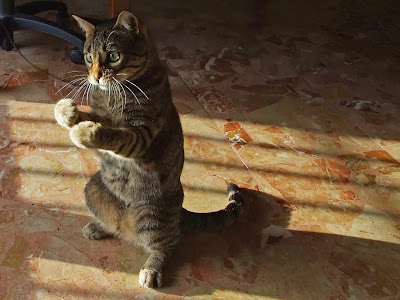
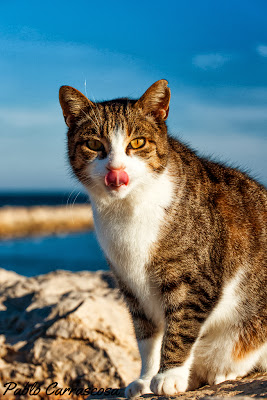
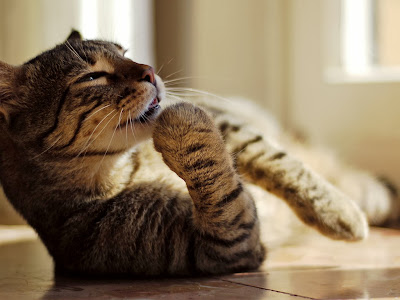
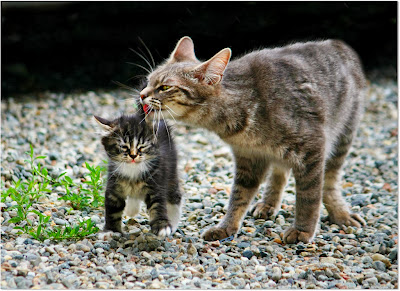







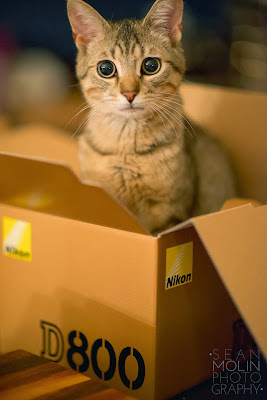




Post a Comment